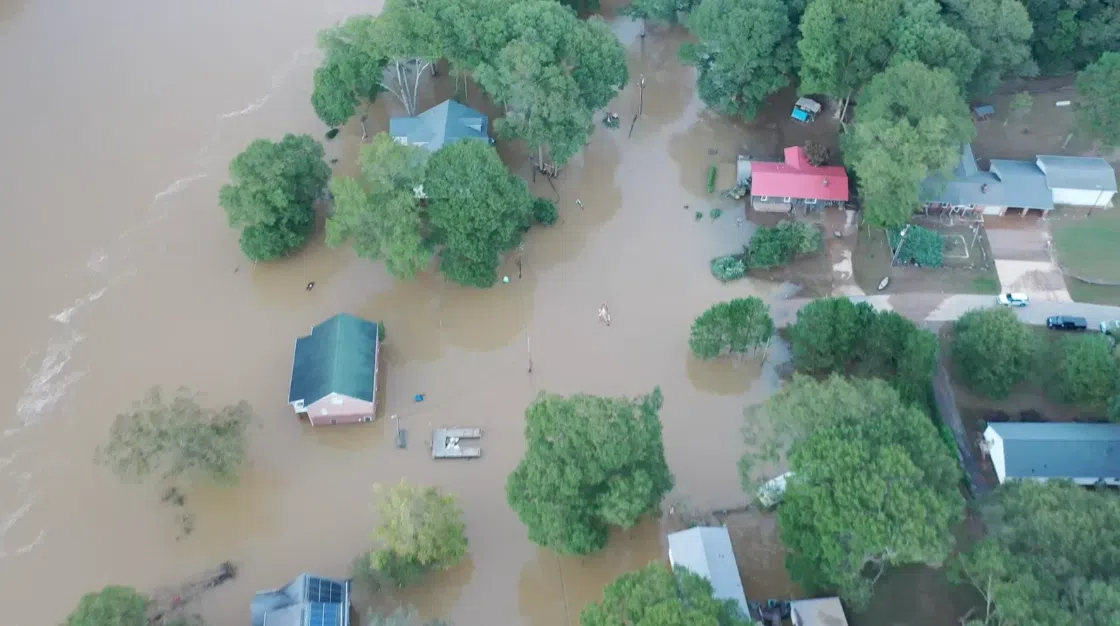
Flooded homes following Hurricane Helene along the Catawba River during a flash flood emergency in Charlotte, North Carolina on Sunday, September 29, 2024. (Daniel Whittaker)
(WTAQ-WLUK) — As relief and recovery efforts continue after Hurricane Helene, officials are urging the public to beware of storm-related scam attempts.
On Monday, United States Attorney for the Eastern District of Wisconsin Gregory J. Haanstad issued a public safety alert, warning residents to be vigilant when making donations.
Authorities say in the wake of natural disasters, fraudsters will target not only victims of the storm, but also citizens across the country who want to help people impacted by the disaster. Scammers often target victims using fraudulent communications or by creating deceiving websites designed to solicit contributions.
“When natural disasters strike, Americans are often are at their best, seeking to help their neighbors and fellow citizens in any way possible. However, these disasters also provide an opportunity for scam artists to take advantage of this compassion and generosity,” Haanstad said in a news release.
Residents of Wisconsin have shown themselves to be among the most thoughtful and caring in the country, often seeking to donate money to relief efforts. To help ensure that these donations reach their intended goal and do not get diverted to those who seek only to enrich themselves, I ask residents of the Eastern District to be mindful as they consider participating in solicited or unsolicited donation requests.
To help prevent yourself from becoming a victim of a Hurricane Helene charity scam, officials say you should exercise diligence before making contributions.
Tips include:
- Carefully evaluate any phone calls, texts, social media posts, e-mails, door-to-door collections, flyers or mailings you receive asking you to make a donation. Be sure it is legitimate prior to donating.
- Make contributions directly to known organizations rather than relying on others to make the donation on your behalf.
- Do not be pressured into making contributions as reputable charities do not use such tactics.
- Do not respond to any unsolicited communications (e.g., e-mails and texts), and never click links contained within those messages because they may be targeting your personal information, to include bank and credit card account information, and other identifiers such as dates of birth and social security numbers.
- Rather than clicking on a purported link to a charity, verify its legitimacy by utilizing various Internet-based resources that may assist in confirming whether the organization is a valid charity.
- Beware of organizations with copy-cat names similar to but not exactly the same as those of reputable charities.
- Avoid cash donations if possible. Pay by credit card or write a check directly to the charity. Do not make checks payable to individuals.
- Know that legitimate charities do not normally solicit donations via money transfer services, and their website will normally end in .org rather than .com.
- Be cautious of e-mails that claim to show pictures of the disaster areas in attached files because the files may contain viruses. Only open attachments from known senders.
Following the devastation of Hurricane Katrina in 2005, the U.S. Department of Justice established the National Center for Disaster Fraud to deter, investigate, and prosecute scammers in the aftermath of disasters. More than 50 federal, state and local agencies participate in the NCDF, which monitors fraudulent activity related to relief operations and funding for victims.
Potential fraud reports can be submitted online or by calling the 24/7 NCDF hotline at(866) 720-5721.





Comments